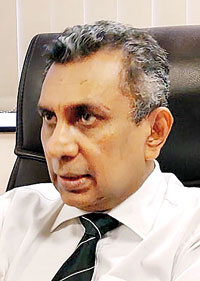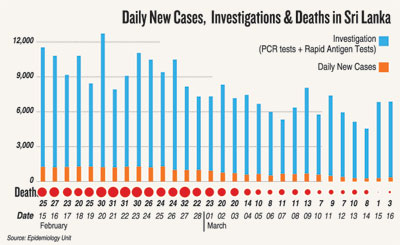News
‘A health contingency plan essential to face SL’s economic crisis’

Dr. Lakshman Edirisinghe
The country’s situation is dire, warned the Government Medical Professionals’ Association (GMPA) this week, urging the health sector to take stock and set out a contingency plan to meet the looming crisis of lack of medicines, consumables and even electricity and fuel to run emergency services, especially in a pandemic situation.
“When a country is drowning in an economic crisis like the one Sri Lanka is experiencing, the first to get hit is the most vulnerable,” says GMPA President Dr. Lakshman Edirisinghe, pointing out that usually the stronger sectors take a hit later. This is called the ladder effect.
However, many sectors both from the bottom and top rungs of the ladder have got affected by the economic crisis including the state health sector that Sri Lanka is very proud of. This is why the GMPA is requesting that a contingency plan be put in place promptly, he said.
A good ‘disaster preparedness plan’ is the need of the hour, he was adamant.
The GMPA is a group of state doctors who have banded together to address critical issues faced by the public with constructive suggestions.
Dr. Edirisinghe shone a red light highlighting the danger areas –
Essential medicines – immediate action is needed to take stock whether the health sector has essential medicines and how long these stocks would last. If there is a short-supply, the plan should detail how hospitals would face it and what needs to be done urgently.
Shortage of consumables – the same applies to consumables and these include the all-important re-agents needed for tests/investigations ranging from the basic to the more complex. These include even routine urine and blood investigations.
Power-cuts & fuel shortage – this double jeopardy would hit healthcare facilities badly because they are inter-dependent. If there is a blackout, all Intensive Care Units (ICUs) where people are on life-breathing ventilators and are battling between life and death need to switch to generators. This was usually for short power outages. How will these hospitals deal with long five-hour power-cuts? What of operations? The dangers are immense.
With a heavy fuel shortage, will these hospitals have adequate stocks to run their generators for lengthy periods and will patients face death?
The generators available for backup may kick in for two-three hours but will they last five, six or seven hours?
Other impacts of power-cuts – refrigeration facilities will be affected not only in hospitals but also Medical Officer of Health (MOH) offices for critical stocks of vaccinations and other medicines needing cold storage. There will also be an adverse impact on testing, sequencing and a whole line of other fields.
Fuel shortages – This impacts the attendance of healthcare staff for the 24/7 essential service of running state health institutions. Whether the staff is using their own private vehicles such as a motorcycle, trishaw or car or public transport such as buses or trains, a fuel crisis impacts them all, as they have to commute daily. Their attendance is essential for rosters to work smoothly and the day shift to flow into the night shift without disruption for the welfare of all patients.
Many other healthcare personnel echoed these views on the grounds that they should not be quoted.
One pointed out that if there are six patients on life-support in an ICU and if the power goes off and the generator does not kick in for about 30 minutes, all these patients would die. This is why these issues cannot be taken lightly, he said.
Citing the example of a cancer patient, another said that everyone knows that chemotherapy is given as cycles, the number of cycles being decided by the Oncologist on the virulence of the malignancy.
This source said that he knew personally of a person who required six cycles of chemotherapy but whose sessions had to be cut to four because of the lack of chemo. Most probably, the patient’s cancer could come back.
A serious concern among healthcare staff is the non-availability of common day-to-day medications vital to control high blood pressure which is a killer bringing about heart attacks and strokes; lipid-lowering drugs for high cholesterol and thyroxin to name a few.
“These are not hi-fi drugs. These are essential to keep people from dying or suffering serious disability,” a doctor said, while another was anguished over the lack of antibiotics, the miracle drugs in overcoming infections.
Many also spoke of mounting issues in the biomedical sector, pointing out that doctors were struggling to manage by looking at X-rays, Magnetic Resonance Imaging (MRIs) and Computerised Tomography (CT) scans on their mobile phones.
A senior doctor said, “We are dealing with people who are alive. We have to make a call whether a person is having pneumonia by looking at an X-ray and the shadows on the lungs. How can you do that on your phone, however good it is?”
Usually, the X-ray or scan will be put up in a lit box for the doctor to look at it closely, but now without films, there is no way to print these images, it is learnt.
This is why many are urging that a disaster preparedness plan be made ready soon.
| ‘COVID-19 risk prevails’ COVID-19 transmission is still prevalent, even if the number of deaths has reduced, said the Director of the Health Promotion Bureau (HPB), Dr. Ranjith Batuwanthudawe on Friday.He told Friday’s media briefing that around 57 Intensive Care Unit (ICU) beds are occupied by COVID-19 patients and a considerable number of patients are receiving treatment in other wards.“The situation is more satisfactory than before but the risk still prevails,” he said.With regard to vaccination against COVID-19, Dr. Batuwanthudawe said:7,646,167 (7.6 million) people have received the booster dose. This is around 53% of the target group. We are strongly encouraging people to get the booster dose so that even if there is a new variant, people will be able to face it. | |
  |
The best way to say that you found the home of your dreams is by finding it on Hitad.lk. We have listings for apartments for sale or rent in Sri Lanka, no matter what locale you're looking for! Whether you live in Colombo, Galle, Kandy, Matara, Jaffna and more - we've got them all!

